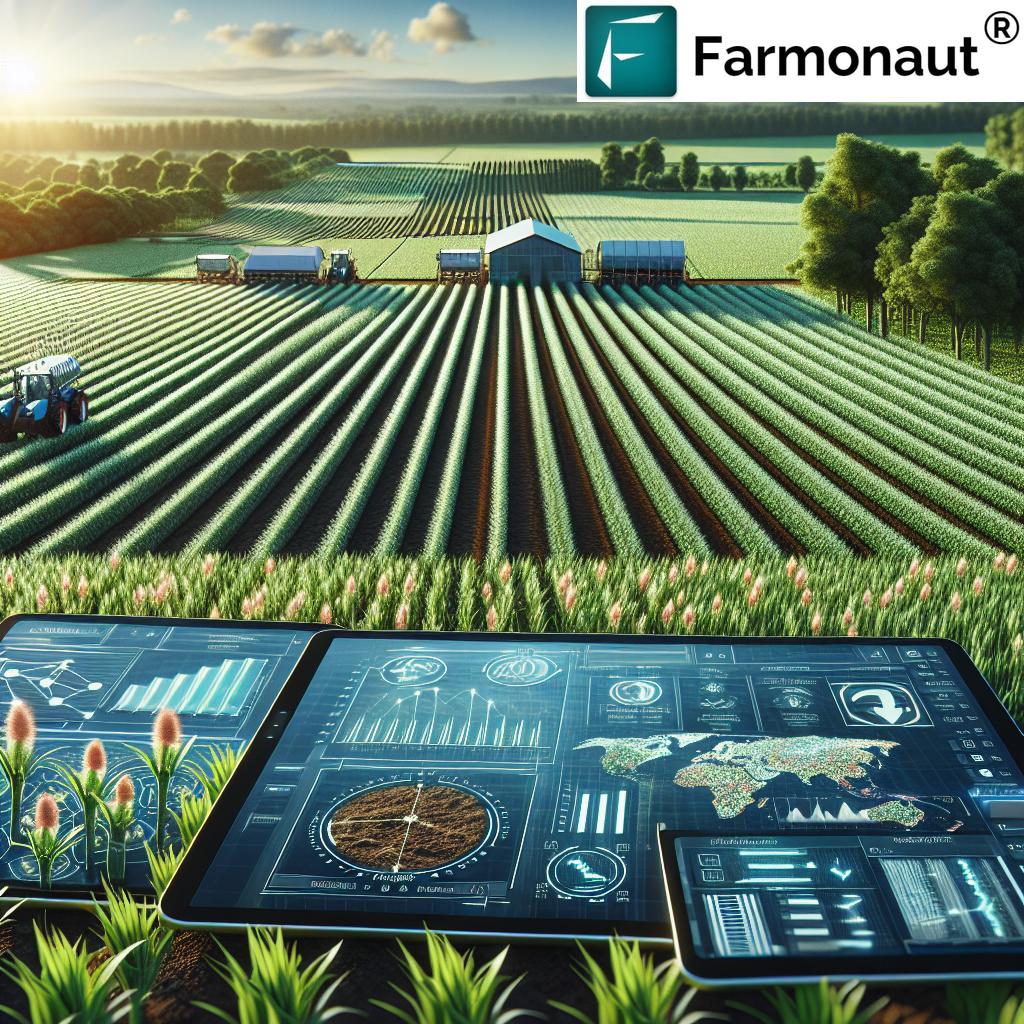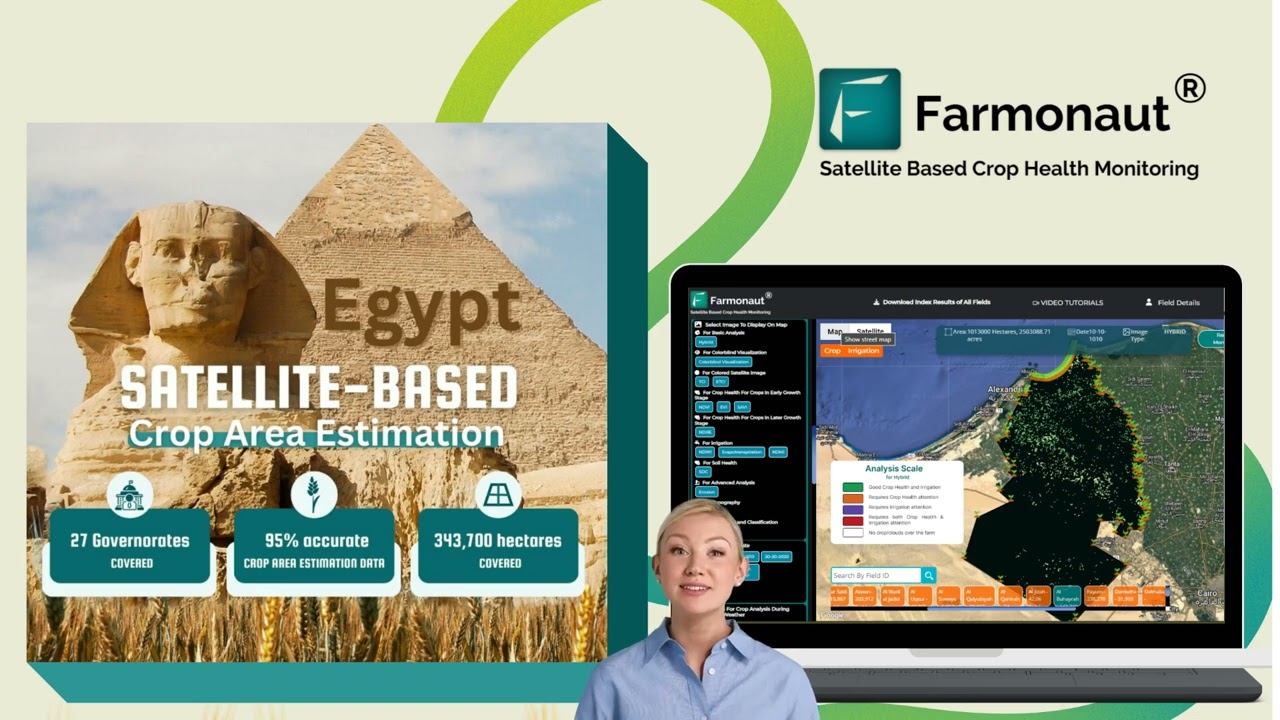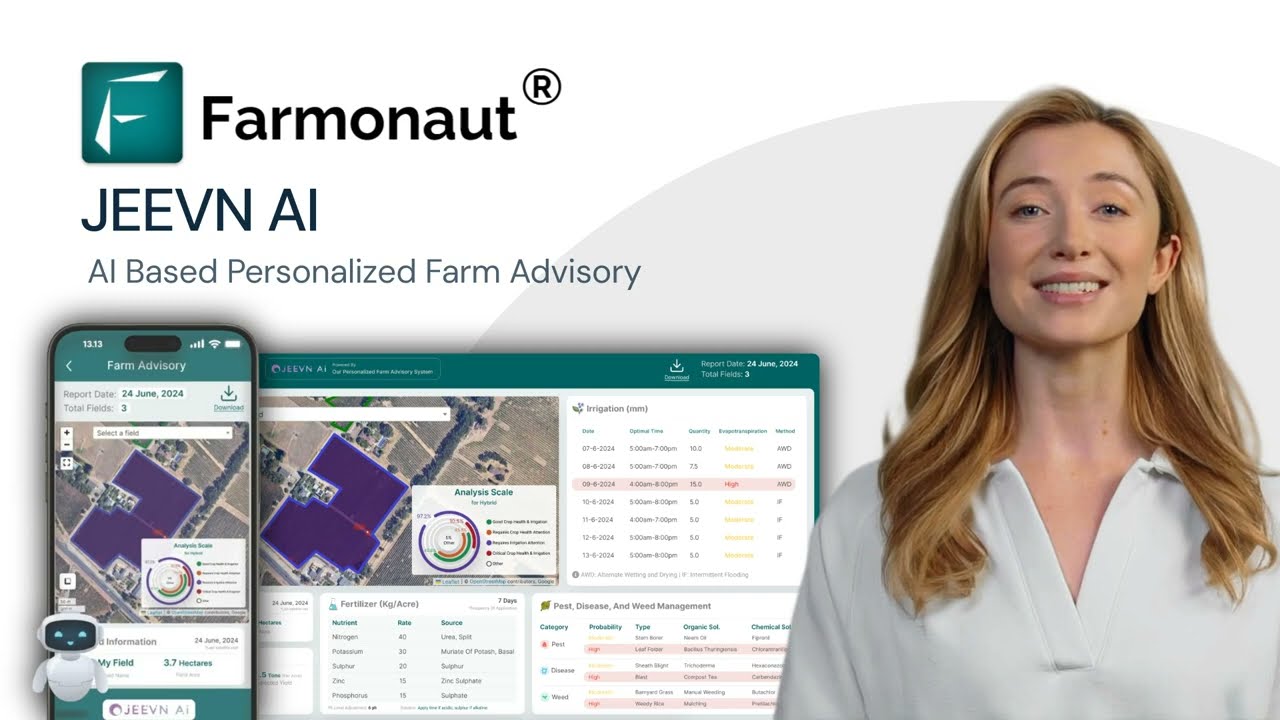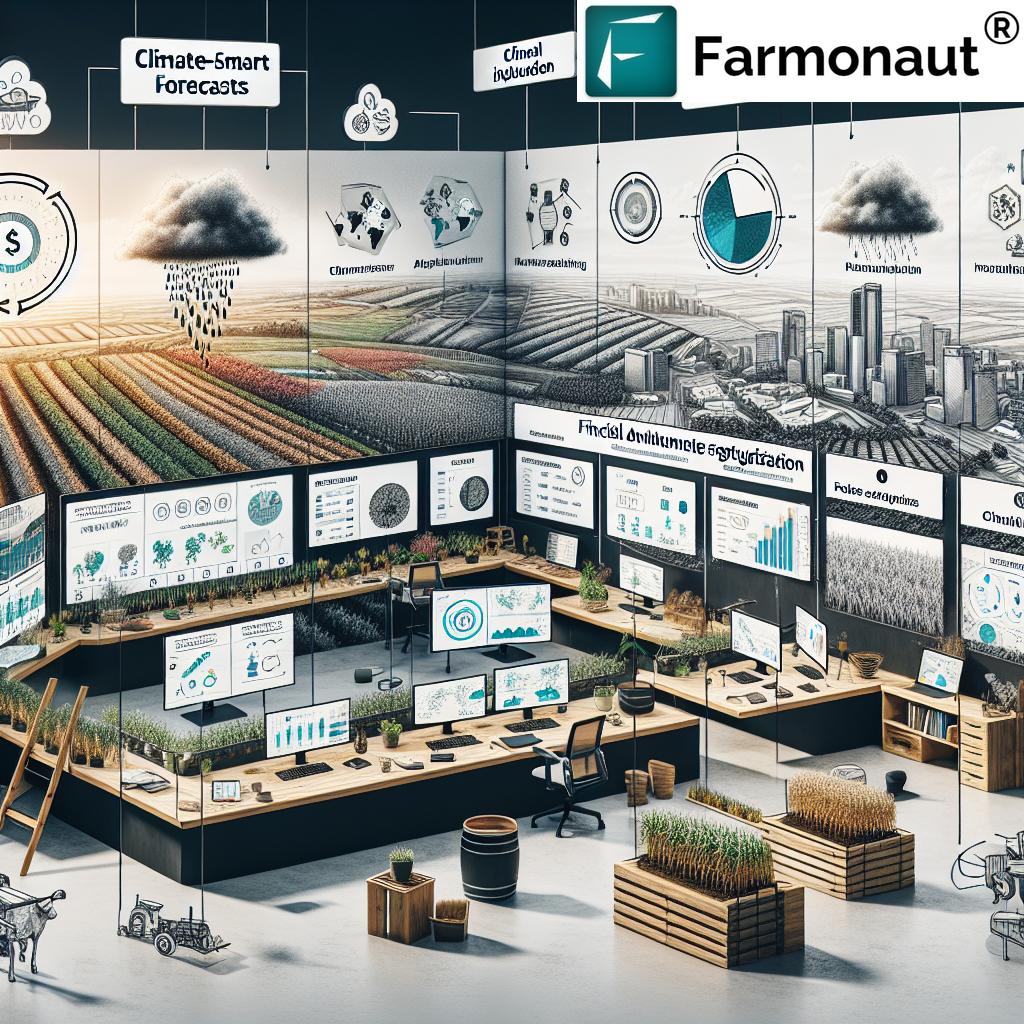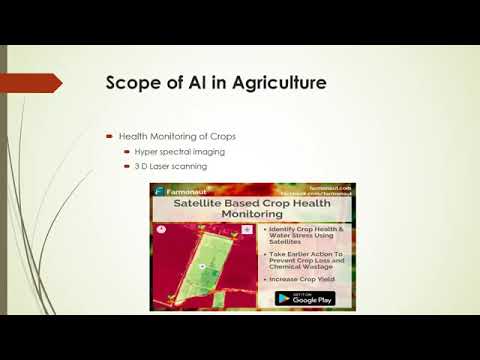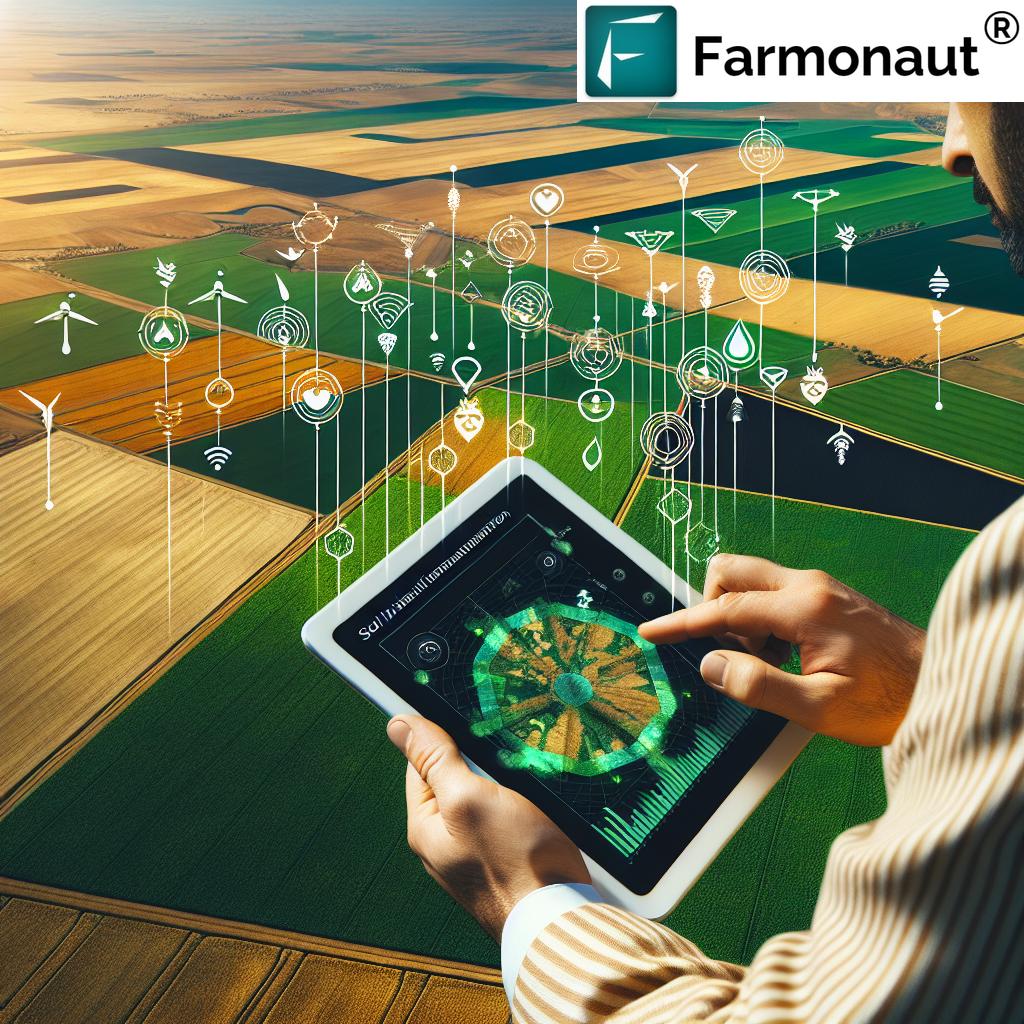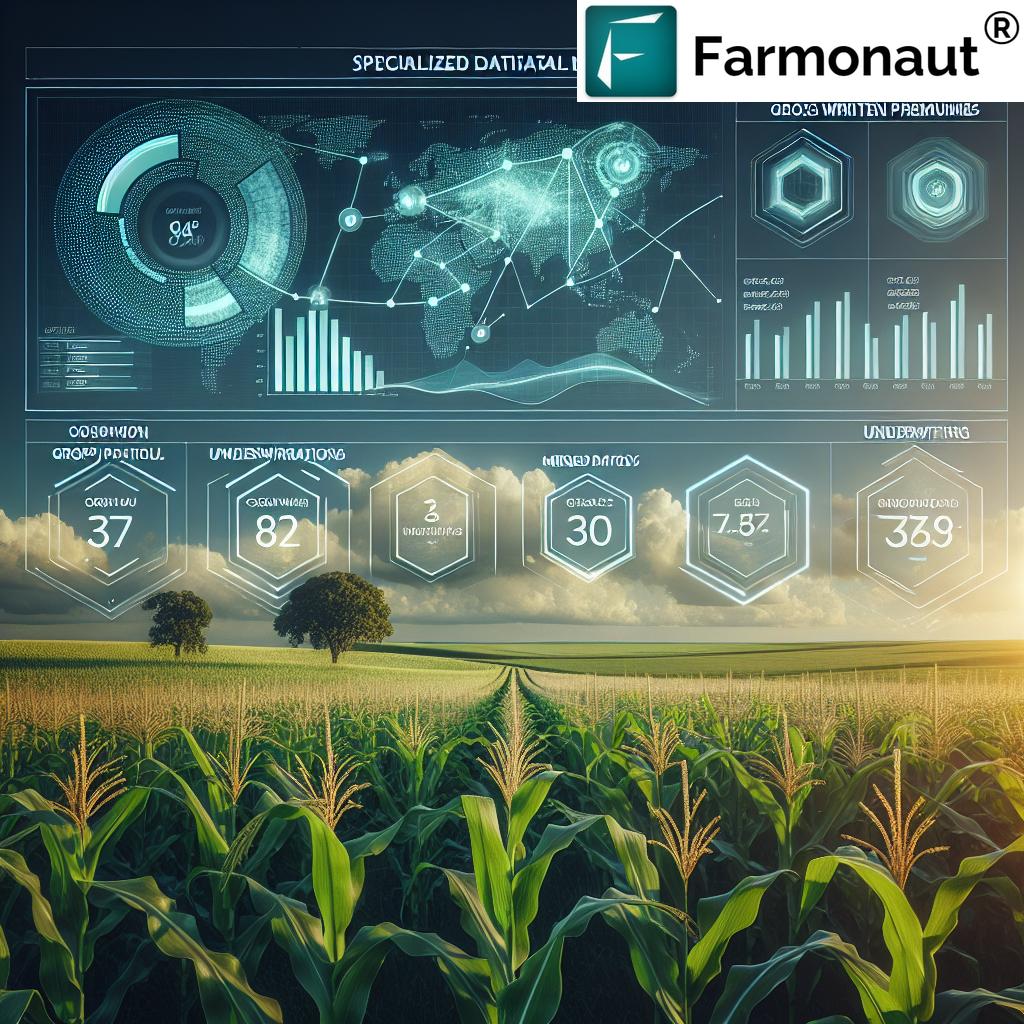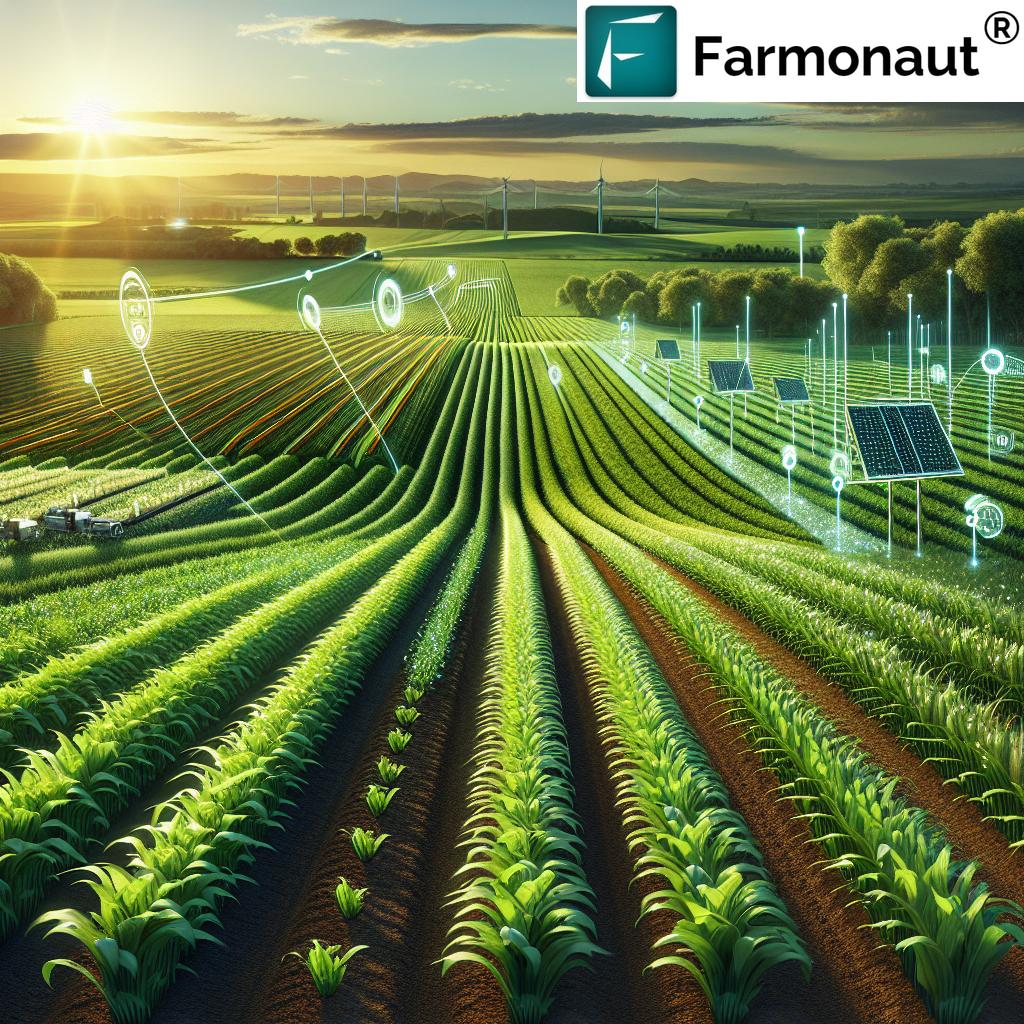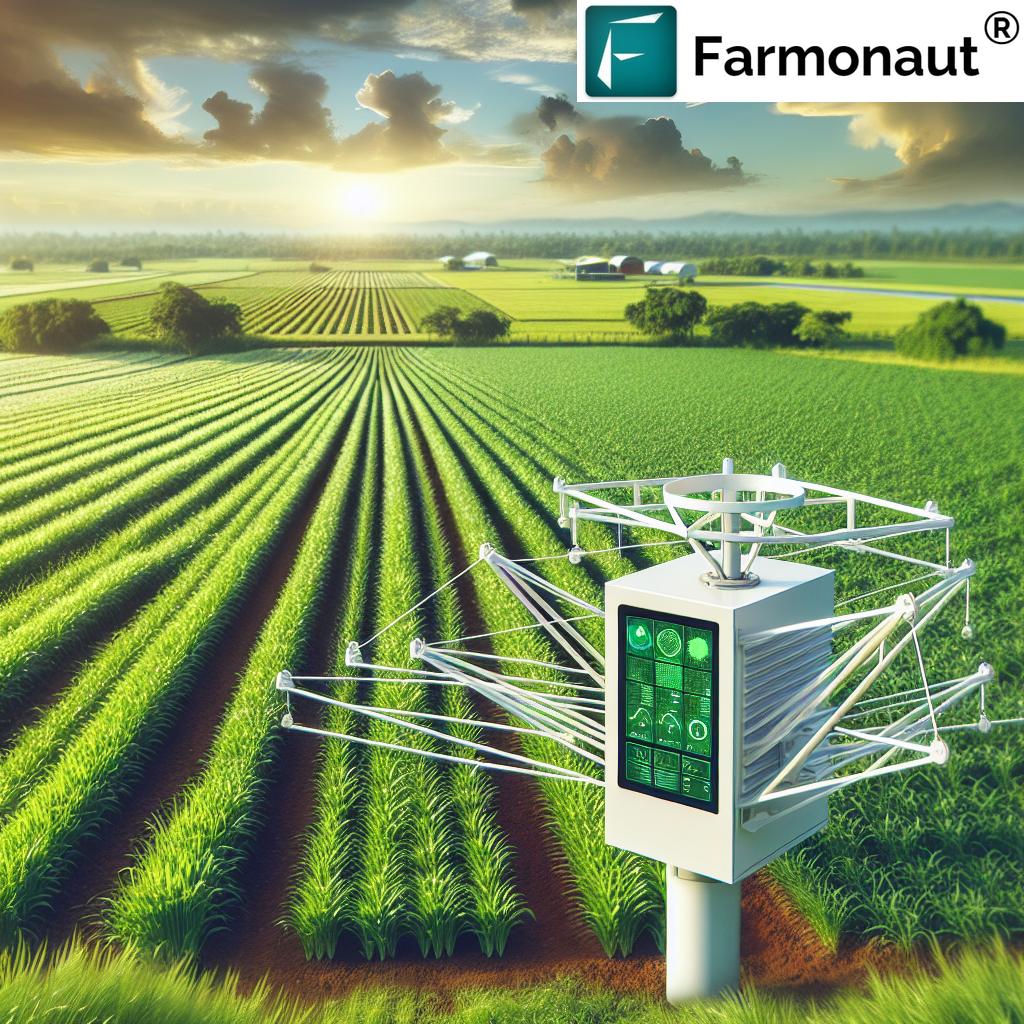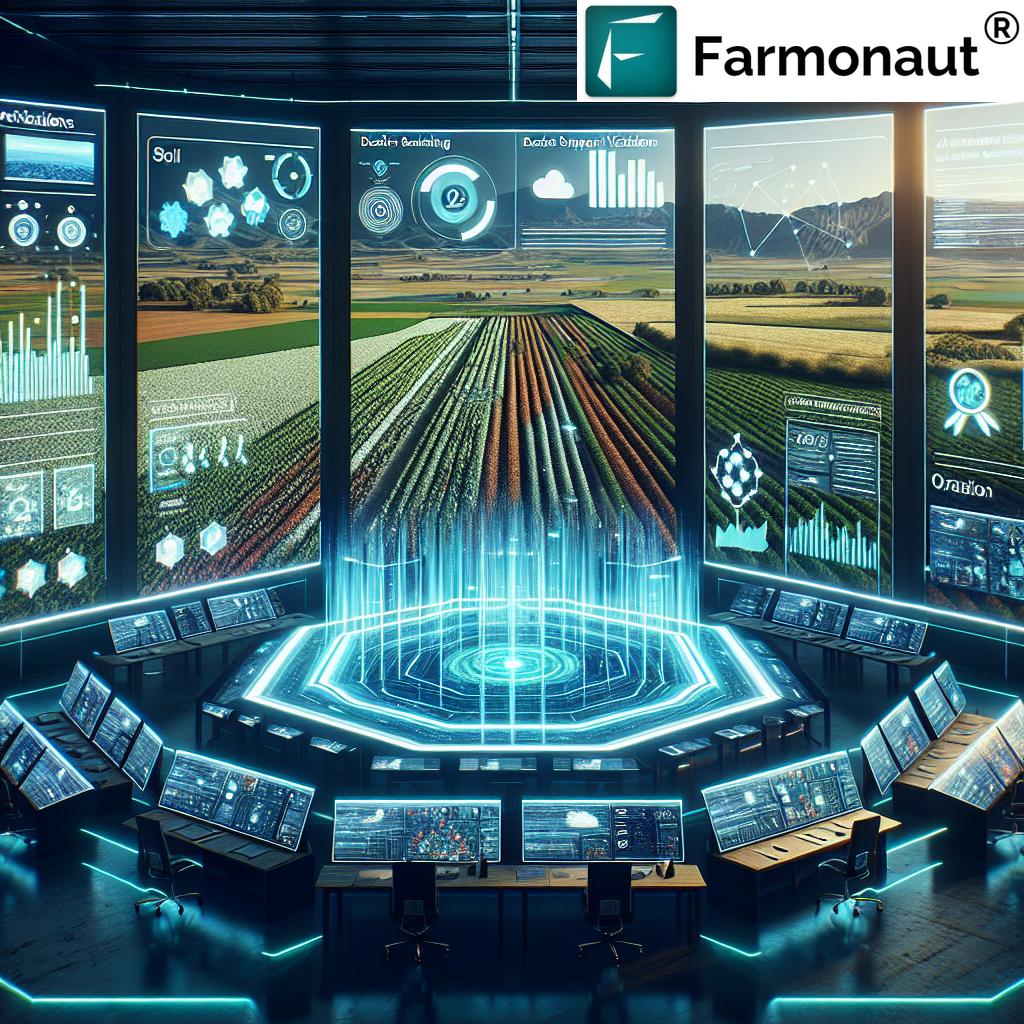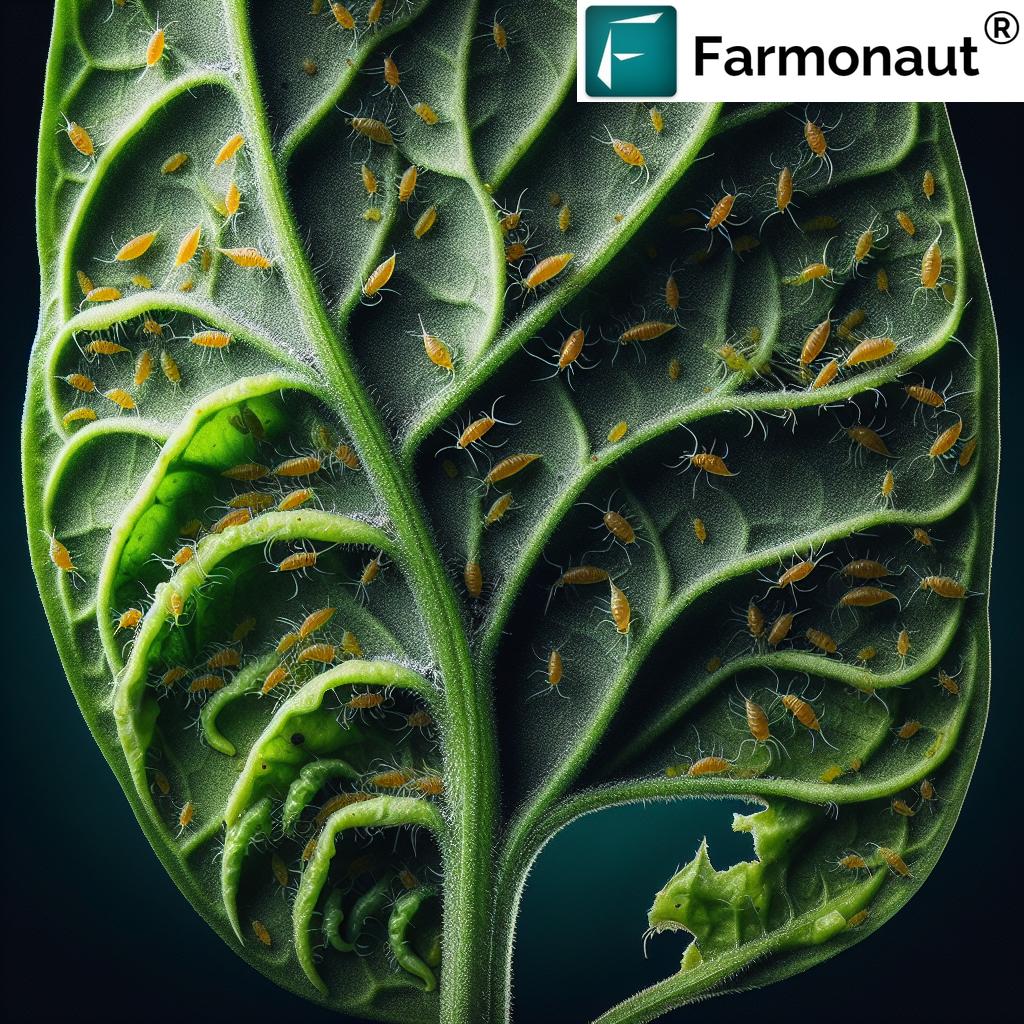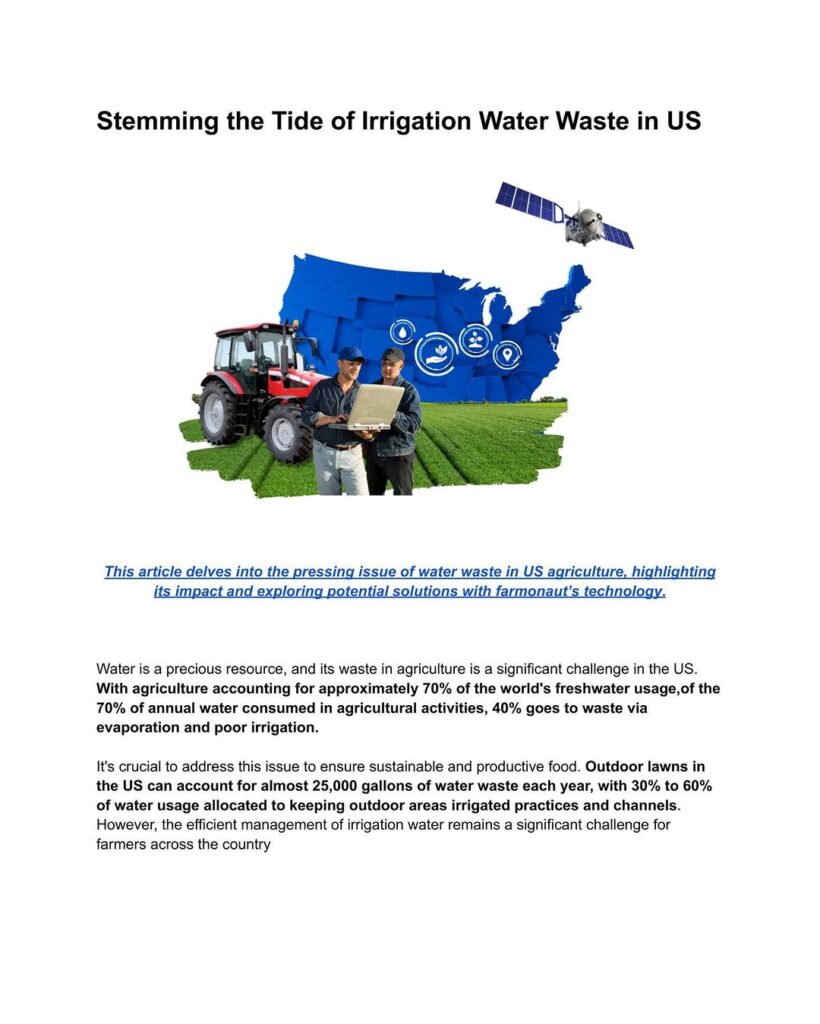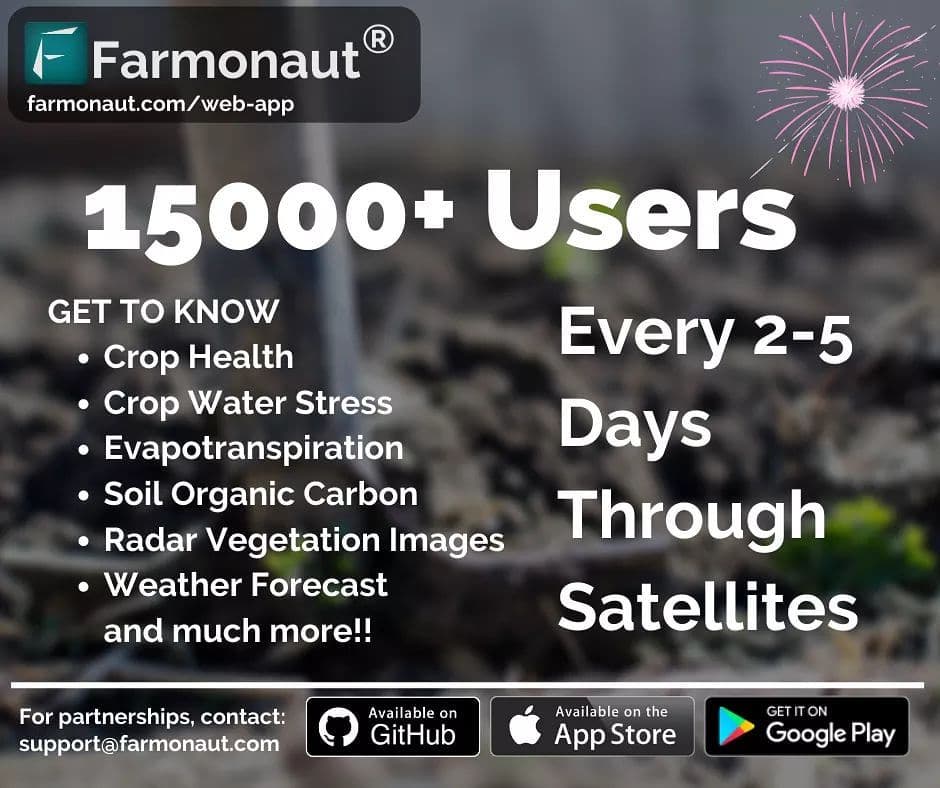Table of Contents
- Introduction: The Power of Agritech in Securing Our Food Future
- Enhancing Productivity Through Precision Agriculture
- Farmonaut: Advanced Agritech Solutions for Farmers
- Improving Food Supply Chain Efficiency with Agritech
- Facilitating Financial Inclusion in Agriculture
- Promoting Climate-Smart Agriculture and Sustainability
- Advancing Biotechnology in Crop Production
- Enhancing Agricultural Data Analytics and Decision-Making
- Addressing Challenges and Ensuring Inclusivity in Agritech Access
- Agritech Solutions for Farmers: Impact Comparison Table
- Farmonaut Subscription Plans
- Frequently Asked Questions
- Conclusion: Building Resilient Food Systems Through Agritech
“Precision agriculture can increase crop yields by up to 30%, significantly enhancing global food security through technology-driven solutions.”
What Is the Impact of Agritech on Food Security?
In an era marked by population growth, climate change, and resource scarcity, ensuring food security is one of humanity’s most critical challenges. As we strive to feed an estimated global population of 9.7 billion by 2050, traditional agriculture must transform.
This transformation is being driven by agritech—agricultural technology innovations and digital solutions that empower farmers to optimize every aspect of the food system. From precision agriculture technologies and AI-driven analytics to biotechnology breakthroughs and enhanced food supply chain efficiency, agritech is not just about boosting crop yields. It’s about cultivating resilience, sustainability, and inclusivity for current and future generations.
In this comprehensive guide, we will explore how agritech solutions for farmers address core challenges:
- Boosting productivity and crop yield improvement
- Optimizing resource management
- Improving access to finance and markets
- Reducing waste and enhancing sustainable farming practices
- Building resilient systems in a changing climate
We’ll also showcase how companies like Farmonaut, a global leader in precision agriculture and digital farm management, provide scalable, accessible solutions for all sizes of operations—from smallholder growers to agribusinesses and government institutions.
Let’s discover together how agritech is revolutionizing the agricultural world and paving the way for a secure food future.
Enhancing Productivity Through Precision Agriculture
Precision agriculture is the foundation of modern farming innovations. By harnessing technology such as satellite imagery, IoT sensors, AI analytics, and digital mapping, we give farmers the ability to monitor and manage field variability in real time.
- Key Goal: Apply the right inputs (water, fertilizers, pesticides) at the right time, in the right areas, for every crop, even at the individual plant level.
- Major Practice: Variable-rate application (VRA) technology adjusts fertilizer and pesticide application based on soil maps, weather forecasts, and crop health data.
Discover how Farmonaut’s crop plantation and forest advisory tools deliver precision insights through mobile and web platforms. Farmers access real-time crop health, pest, and resource management data without expensive hardware, making advanced precision agriculture affordable and accessible worldwide.
Benefits of Precision Agriculture Technologies
- Crop yield improvement: US guidance systems boost output by 9%; soil maps up to 13% increase in yield; Argentina’s tailored management saw a 54% jump!
- Resource optimization: Water, fertilizer, and pesticide usage are minimized—reducing input costs and environmental impact.
- Real-time monitoring: Satellite imagery, drones, and sensors monitor growth, soil moisture, pests, and input needs—improving risk management.
- Waste reduction: Only apply what is truly needed, where and when it’s needed, reducing waste and runoff.
How Satellite & AI Integration Take Farm Management to the Next Level
Real-time data from satellites or on-field sensors can be processed by AI advisory systems. These systems generate precise recommendations for irrigation, fertilizers, and pest management—optimizing input use and increasing productivity for every field segment.
Farmonaut’s Jeevn AI advisory system delivers actionable guidance, localized weather forecasts, and crop health alerts, all linked to the latest satellite-based monitoring.
For larger operations, Farmonaut’s fleet management solutions help optimize machinery and vehicles—improving logistics, reducing input waste, and ensuring safe and efficient farm management.
How Precision Agriculture Empowers Farmers at Every Level
Whether for smallholders in Africa or agribusinesses in the Americas and Europe, precision agriculture systems are transforming fields and livelihoods. By improving crop yields, reducing input costs, and enabling sustainable farming practices, these solutions are advancing the cause of food security globally.
Farmonaut: Advanced Agritech Solutions for Farmers
Farmonaut is a game-changer in the world of agritech—combining state-of-the-art satellite technology, AI, machine learning, and blockchain to deliver precision agriculture solutions accessible to all. Our mission is to democratize precision agriculture, making advanced crop monitoring, resource management, and data analytics universally available.
- Satellite-Based Crop Health Monitoring: Get instant access to multispectral satellite imagery for tracking vegetation health (NDVI), soil moisture, and weather patterns.
- AI Advisory Systems: Farmonaut’s Jeevn AI provides customized advice, crop health alerts, and localized weather forecasting for every farm and crop type.
- Blockchain Product Traceability: Ensure food supply chain efficiency and authenticity with tamper-proof records from farm to consumer. Learn more about Farmonaut traceability solutions.
- Carbon Footprinting: Our platform helps agricultural businesses track and reduce carbon emissions in real time, supporting sustainability and regulatory compliance. More on Farmonaut carbon footprinting here.
- Flexible Subscription Model: Choose packages by area, update frequency, and data type—supporting individual farmers, cooperatives, enterprises, and public agencies.
Farmonaut’s agritech platform is accessible via Android, iOS, web browsers, and API (API details, API developer docs), enabling seamless data exchange and integration with other digital agriculture platforms. Farmonaut empowers farmers and agribusinesses to make data-driven decisions for better production, efficiency, and sustainability.
Improving Food Supply Chain Efficiency with Agritech
Reducing food loss and waste is vital for food security. In many developing regions, farmers still encounter challenges with post-harvest infrastructure, shelf life management, and unreliable market access. These gaps in the supply chain can result in up to 30-40% of crops never reaching consumers.
How does agritech help?
- Drones and Sensors: Drones carefully monitor crop health, assess ripeness, and enable precise application of pesticides or nutrients—reducing waste and labor costs.
- Blockchain Traceability: Digital records via blockchain ensure transparent product traceability for consumers and merchants. Fraud is reduced, trust is increased. Explore Farmonaut’s blockchain traceability tools here.
- Indoor & Vertical Farming: Supported by automation and data insights, these techniques allow year-round crop production while using less land and water.
- Digital Market Platforms: With online & mobile access, farmers and merchants connect directly, improving fair pricing and reducing intermediaries.
Access to finance is another bottleneck for smallholder growers. Farmonaut’s crop loan and insurance services leverage satellite verification and risk scoring to help reduce fraud, speed up loan approval, and unlock better credit options—vital for improving input application and crop yields.
“Agritech innovations have helped reduce water usage in farming by nearly 20%, promoting sustainable and resilient agricultural practices.”
Facilitating Financial Inclusion in Agriculture
Financial inclusion in agriculture is vital to unlock the potential of the world’s farmers, especially in developing regions where access to capital is a barrier. Many farmers struggle to obtain credit for seeds, fertilizers, equipment, or insurance, which undermines their ability to invest in modern practices and increase yields.
How Agritech Platforms Bridge the Finance Gap
- Digital agriculture platforms connect farmers with microfinance, agri-banks, and insurers, leveraging real-time data for
credit risk scoring and claim validation. - Tailored loan models: Some platforms offer credit based on actual or forecasted crop yields—requiring minimal paperwork and reducing financial risk for lenders.
- AI-driven verification: Platforms like Farmonaut analyze satellite imagery and weather forecasts to vet loan applications, validate crop damage, or automate insurance payouts.
By using AI and precision agriculture technologies, financial institutions can assess risk more accurately, enabling more farmers to obtain financing and invest in sustainable improvements.
Promoting Climate-Smart Agriculture and Sustainability
Climate change is a growing threat to global food security, affecting weather patterns, water availability, soil health, and crop yields. Agritech empowers climate-smart agriculture by providing the tools to adapt, mitigate, and build resilience into farming systems.
- AI-driven advisory: Advanced algorithms suggest planting schedules, cultivar selection, and input management practices matched to forecasted climatic conditions.
- Water management systems: IoT-linked sensors and smart irrigation enable precision watering according to real-time soil moisture, reducing water use by 20% or more while safeguarding crop health.
- Carbon footprinting: By tracking farm-level GHG emissions, innovative platforms such as Farmonaut help businesses and growers adopt low-carbon strategies that meet both productivity and sustainability goals. Explore Farmonaut’s carbon solutions
- Training & awareness: Digital platforms deliver training in sustainable practices, soil restoration, and climate adaptation—empowering communities to respond to environmental stresses.
Together, these strategies make agriculture not just more efficient, but also future-proofed against climate change and extreme weather.
Advancing Biotechnology in Crop Production
Biotechnology in crop production is pivotal for safeguarding the world’s food supply. By using genetic science, breed selection, and advanced molecular techniques (like CRISPR or genome editing), new crop varieties are developed to withstand:
- Drought and heat (climate adaptability)
- Emerging pests and diseases
- Reduced resource inputs (water, fertilizers, pesticides)
- Greater nutritional content
Agritech-enabled laboratories and digital data platforms allow scientists and breeders to rapidly test, validate, and scale resilient varieties—helping farmers respond to global challenges and changing market needs.
How Does Biotechnology Drive Food Security?
- Speed: Modern tools can develop resistant cultivars in years, not decades.
- Precision: Molecular editing introduces only desirable traits, minimizing guesswork and unwanted outcomes.
- Nutritional Enhancement: Enriches staple crops with essential vitamins, minerals, or protein (improving food quality).
- Yield Security: Genetically robust plants mean more reliable output even in the face of unpredictable weather or diseases.
This proactive approach is vital for both the developed world and regions prone to climate extremes or resource scarcity.
Enhancing Agricultural Data Analytics and Decision-Making
At the heart of digital agriculture is data utilization—from raw sensor feeds and AI analytics to web-based advisory platforms. The power of agricultural data analytics lies in turning vast records into actionable intelligence for every decision, from planting and irrigation to supply chain management.
Key Benefits
- High-resolution weather forecasts: Allow farmers to prepare for drought, rain, or heat waves, optimizing yields and minimizing risk.
- Resource management: Real-time tracking of soil nutrients, moisture, and input application for every field zone.
- Pest and disease warnings: AI-based systems notify users when and where threats are likely to emerge.
- Market intelligence: Link production data to pricing and demand—enabling better harvest timing and profit.
Farmonaut’s AI-based advisory platform sets the benchmark in actionable, timely data at scale—helping everyone from smallholders to governments to make smarter decisions about crops and markets.
Explore Farmonaut’s large-scale farm management system—an all-in-one toolset offering area estimation, satellite health analytics, and integrated resource tracking.
Addressing Challenges and Ensuring Inclusivity in Agritech Access
Despite rapid advances, agritech adoption remains uneven. Obstacles such as cost barriers, digital literacy gaps, and connectivity issues persist, particularly in rural, resource-poor areas.
- Access barriers: Not all farmers have smartphones, high-speed internet, or the training to use digital tools.
- Lack of awareness: Many are unaware of the return on investment or the improved sustainability unlocked by digital agriculture.
- Data quality disparities: In regions with sparse data, AI algorithms may suffer accuracy issues.
- Inclusivity: Digital solutions must be available in local languages and accessible for marginalized communities, closing the digital divide.
How Agritech Solutions & Platforms Are Addressing These Gaps
- Mobile-based apps with intuitive design for low-literacy users.
- Cloud-connected advisory systems that work even with intermittent internet.
- Integration with trusted local agronomists, merchants, and co-ops—ensuring support beyond pure technology.
- Collaborative initiatives for outreach, subsidy, and capacity-building programs focused on training.
At Farmonaut, we are committed to inclusive innovation—offering affordable, data-driven solutions that empower farmers everywhere to cross the digital divide and benefit from advanced agritech, regardless of geography.
Agritech Solutions for Farmers: Impact Comparison Table
To understand how different precision agriculture technologies improve food security metrics, see our comparison below:
| Agritech Technology | Estimated Crop Yield Increase (%) | Water Use Efficiency Improvement (%) | Reduction in Input Costs (%) | Enhanced Resilience (%) |
|---|---|---|---|---|
| Satellite Imagery & Remote Sensing | 10-25% | 15-30% | 10-25% | 20-40% |
| IoT Sensors | 8-18% | 20-40% | 10-20% | 15-30% |
| Drones | 7-15% | 10-18% | 8-15% | 12-22% |
| Smart Irrigation Systems | 10-20% | 25-40% | 12-22% | 15-28% |
*Percentages are industry estimates and may vary by crop, region, and implementation scale. These illustrate the significant positive impact of precision agriculture technologies on food security and resource utilization.
Farmonaut Subscription Plans
For affordable real-time crop health monitoring, resource management, and advanced digital agriculture, explore our flexible subscription packages below.
Choose a plan based on your acreage, data update frequency, and farm management needs.
Frequently Asked Questions: Agritech and Food Security
What is agritech and why is it important for food security?
Agritech refers to a suite of innovations—like precision agriculture, AI analytics, satellite monitoring, and biotechnology—that increase efficiency, productivity, and resilience across the entire agricultural value chain. Agritech directly enhances food security by increasing yields, minimizing resource waste, reducing vulnerability to climate and pests, and optimizing supply chains.
How does precision agriculture benefit smallholder farmers?
Precision agriculture technologies help smallholders target their resources (water, fertilizers, pesticides) where they matter most, reducing costs and boosting output. Mobile and satellite-driven services make it accessible without expensive equipment.
What challenges limit the adoption of agritech solutions?
Barriers include lack of awareness, limited digital skills, infrastructure gaps, cost, and connectivity issues. The most successful initiatives promote financial inclusion, offer training, and design user-friendly platforms tailored for low-literacy and remote users.
Is agritech only for large-scale commercial farms?
No. Leading platforms—such as Farmonaut—make precision agriculture and digital farm management scalable and affordable for individual farmers, cooperatives, agribusinesses, and government users worldwide.
How does biotechnology in crop production contribute to global food security?
By developing resilient crop varieties, increasing resistance to pests and climate extremes, and enhancing nutritional content, biotechnology ensures consistent and high-quality food production—critical for a growing global population facing resource and climate pressures.
What data capabilities do agritech platforms offer for decision-makers?
Digital platforms provide real-time weather forecasts, soil and crop analytics, pest and disease alerts, and market data, allowing for better planning at every stage—from planting to harvest to marketing.
Conclusion: Building Resilient Food Systems Through Agritech
The impact of agritech on food security goes far beyond yield increase. It is about empowering farmers, enhancing resource efficiency, mitigating climate risks, and closing the inclusion gap across the globe.
- With precision agriculture, we boost productivity and minimize losses.
- Through supply chain innovation and traceability, we reduce food waste and enhance trust.
- By enabling financial inclusion, more farmers can invest in the tools needed for sustainable growth.
- With climate-smart agriculture and biotechnology, we make our food systems resilient for generations to come.
Farmonaut is proud to be a leader in this transformation—delivering satellite-based, AI-powered tools that democratize advanced agriculture worldwide. Whether you are a solo grower, a cooperative, an agribusiness, or a policy-maker, our mission is to make agritech affordable, accessible, and impactful for every field and every farmer.
The future of food security is digital, sustainable, and inclusive—and together, through agritech, we are ready to meet the world’s greatest challenges.


